Keep up to date with the latest news, information and events from Aussie Hands.
Media story
Aussie Hands 25th Anniversary Celebration
Lesa Scholl, Key Change Communications – 21 October 2025
'He never saw any barriers': Aussie Hands marks 25 years
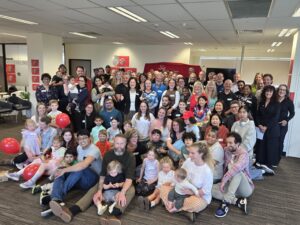 Through the vision and determination of founder Elizabeth Borg, Aussie Hands has created a community for countless children, young people and their families living with a hand difference.
Through the vision and determination of founder Elizabeth Borg, Aussie Hands has created a community for countless children, young people and their families living with a hand difference.
Aussie Hands provides guidance, mentoring and education, but perhaps most importantly a sense of belonging for children and their families.
A quarter of a century on, Aussie Hands has 26 partnerships across Australia and overseas, and members in more than 2,000 households. Many of those members joined together at the Royal Children’s Hospital Foundation to celebrate this milestone.
Member story
Music has brought frustration, healing and happiness for Emi
Fiona Passmore
Playing and teaching the piano, percussion and recorders with a hand difference
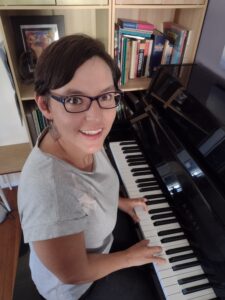 When Emi is teaching, she shows the kids her hand difference as they’re walking to their first lesson which gives them time to ask questions and get used to it. She says to them, ‘On the piano we are going to use all 5 fingers – show me your 5 fingers – mine are a bit different I only have 3.’ Some kids are a bit surprised, most are curious and then they are cool with it.
When Emi is teaching, she shows the kids her hand difference as they’re walking to their first lesson which gives them time to ask questions and get used to it. She says to them, ‘On the piano we are going to use all 5 fingers – show me your 5 fingers – mine are a bit different I only have 3.’ Some kids are a bit surprised, most are curious and then they are cool with it.
Our understanding of limb difference is changing, and these young Australians are leading the way
ABC News, 3 July 2022
Young Aussie Hands members lead the way in changing attitudes towards limb difference
Written by national disability affairs reporter Elizabeth Wright.
Knox Gibson believes he’s “better off” having one arm and not two. ‘I think I’m really lucky….the things I’m doing and the things I’m going to be doing are just amazing,’ he said.
In 2017, Ayelet Marha started her travel Instagram accounts where she shares photos of her nubbins, instead of selfies. ‘I think it’s a really fun way to spread awareness of limb differences, specifically mine,’ she said.
Member story
Job dilemmas, being in the public eye and Aussie Hands president – Stuart’s story
Lily Toengi-Andrews
One dilemma for people with hand and limb differences can be the job interview. How much to tell, what to tell, do I tick the disability box or wait until an interview...
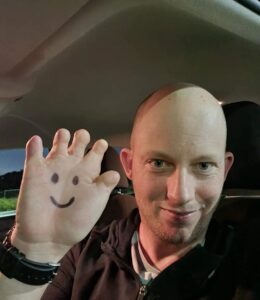 One dilemma for people with hand and limb differences can be the job interview. How much to tell, what to tell, do I tick the disability box or wait until an interview, will they judge me, do I have to prove myself, are all questions that can go through your mind.
One dilemma for people with hand and limb differences can be the job interview. How much to tell, what to tell, do I tick the disability box or wait until an interview, will they judge me, do I have to prove myself, are all questions that can go through your mind.
Ticking the disability box can go two ways. The potential employer could see it as more work and expense for them if they need to change anything in the workplace, or it could be welcomed as it encourages diversity and satisfies company requirements.
Find out how Stuart deals with it.
Member story
A special fit – Tom’s grasp on prosthetics and link to Aussie Hands
Fiona Passmore
What ignited Tom’s interest in prosthetics, what has he learnt and how has he helped the Aussie Hands community?
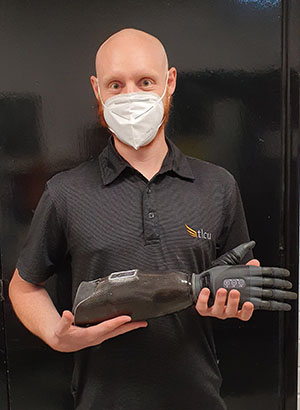 ‘My pop lost his finger in a go-karting accident and although he didn’t wear a prosthesis, this must have aroused some curiosity in me,’ remembered Tom. ‘My imagination and interest were further captured by my year 10 history teacher who had done some aid work in Cambodia and chatted to me about the land mine victims over there. I’m so grateful that he did as I’ve certainly found the world of prosthetics to be a rewarding and interesting way to earn a living.’
‘My pop lost his finger in a go-karting accident and although he didn’t wear a prosthesis, this must have aroused some curiosity in me,’ remembered Tom. ‘My imagination and interest were further captured by my year 10 history teacher who had done some aid work in Cambodia and chatted to me about the land mine victims over there. I’m so grateful that he did as I’ve certainly found the world of prosthetics to be a rewarding and interesting way to earn a living.’
Member story
Challenges, connections and mentoring – Natalie’s story
Lily Toengi-Andrews
Natalie is the youngest mentor in the newly rolled out Aussie Hands Peer Support Network and Resource Toolkit and is looking forward to supporting kids in the areas of making friends, confidence, self-care and driving.
Natalie is the youngest mentor in the newly rolled out Aussie Hands Peer Support Network and Resource Toolkit and is looking forward to supporting kids in the areas of making friends, confidence, self-care and driving.
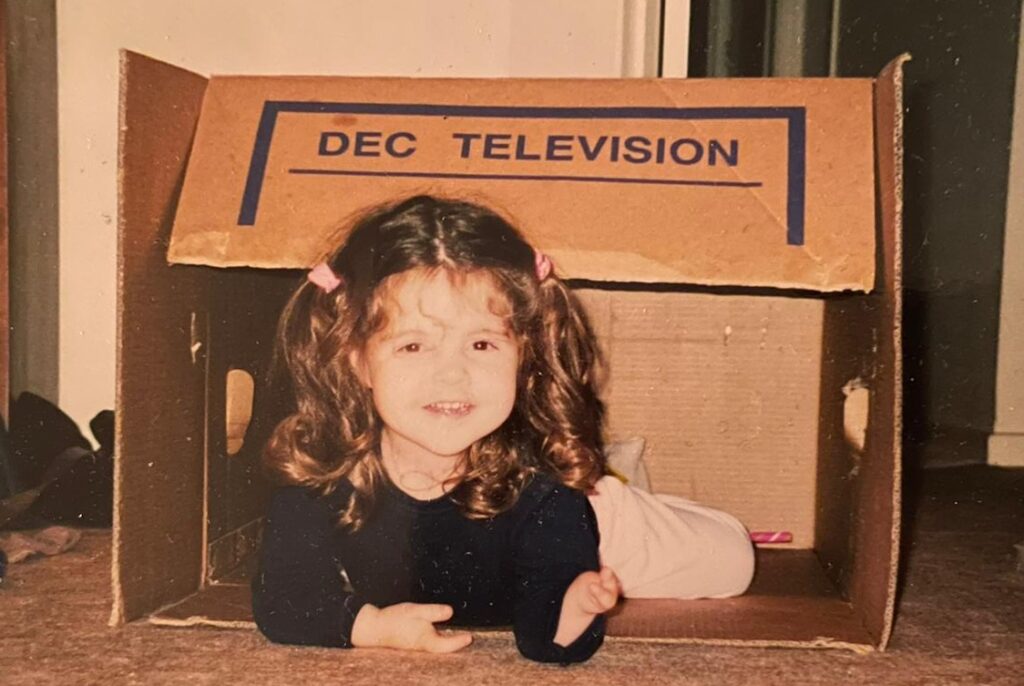 Natalie has a bilateral ulnar longitudinal deficiency, and said that growing up in rural Australia had its difficulties, particularly as there were no mentors, little support for her limb difference and little access to a whole lot of things: resources, funding, support groups, sports, learning to drive, specialists, occupational therapists, physiotherapists, whatever you may need. ‘I grew up and interacted with a lot of people who had disabilities, and we would go to similar things, but there wasn’t anyone like me, having something so rare and unheard of,’ she said. ‘Hopefully we can change this a bit with the mentor program.’
Natalie has a bilateral ulnar longitudinal deficiency, and said that growing up in rural Australia had its difficulties, particularly as there were no mentors, little support for her limb difference and little access to a whole lot of things: resources, funding, support groups, sports, learning to drive, specialists, occupational therapists, physiotherapists, whatever you may need. ‘I grew up and interacted with a lot of people who had disabilities, and we would go to similar things, but there wasn’t anyone like me, having something so rare and unheard of,’ she said. ‘Hopefully we can change this a bit with the mentor program.’
Aussie Hands Peer Support Network and Resource Toolkit Launched!
Jacqueline Banki, ICB Project Manager
We are excited to announce the launch of our Peer Support Network and Resource Toolkit today!
The Peer Support Network is open to all Aussie Hands members and the Resource Toolkit has been designed for parents of kids from zero to 18 and for teenagers.
ICB Steering Committee Chair, Brooke Young said: ‘Our aim was to create innovative resources that help build skills and self-confidence for individuals with a hand difference. They were developed in partnership with Aussie Hands members, health professionals, education experts and government departments. This was to ensure that the resources are practical, up to date and evidence based. Another great thing about the resources is that they are online and can be accessed anytime, anywhere.’
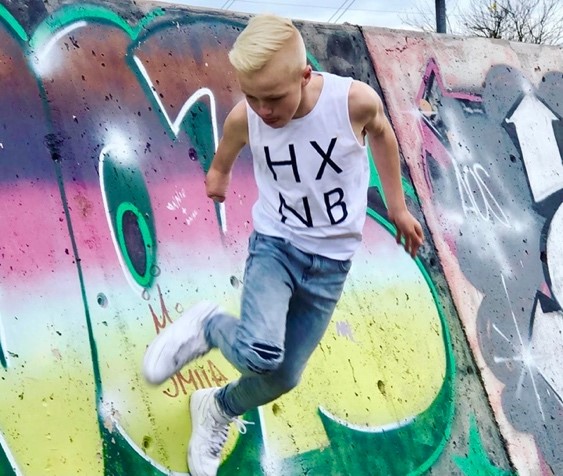 The development of project resources is funded by the Australian Government Department of Social Services.
The development of project resources is funded by the Australian Government Department of Social Services.
‘While being developed over the past 14 months, these resources would not have been possible without the contribution of our Aussie Hands members via interviews, workshops and surveys and sharing their lived-experience stories, quotes, photos and videos,’ emphasised ICB Project Manager Jacqueline Banki.
‘I would like to thank valuable support from the ICB Steering Committee: Brooke Young, Karen Macdonald, Fiona Passmore, Lisa Robin, Hannah Cole and Samantha Donaghey.
It has been an incredible journey to bring to life such an array of resources while working with Project Officer Cassie Muller, Digital Communications Officer Vinnie Chen and so many Aussie Hands members,’ added Ms Banki.
Peer Support Network
 The Peer Support Network enables individuals with a hand difference, parents or carers to select an experienced and caring mentor to help with issues such as building confidence, improving communications skills and developing a more positive self-image.
The Peer Support Network enables individuals with a hand difference, parents or carers to select an experienced and caring mentor to help with issues such as building confidence, improving communications skills and developing a more positive self-image.
Thank you to our 22 peer mentors who will draw from their own experience and expertise to discuss tips and strategies to help mentees achieve their goals and are available to book now.
Resource Toolkit
The Resource Toolkit offers tips, lived experience stories and activities.
Ms Young explained: ‘People like Australian of the Year Dylan Alcott are highlighting the importance of role models and for everyone to be able to achieve their potential. These resources address just that – they share information, ideas and practical tools across topics in three life stages:
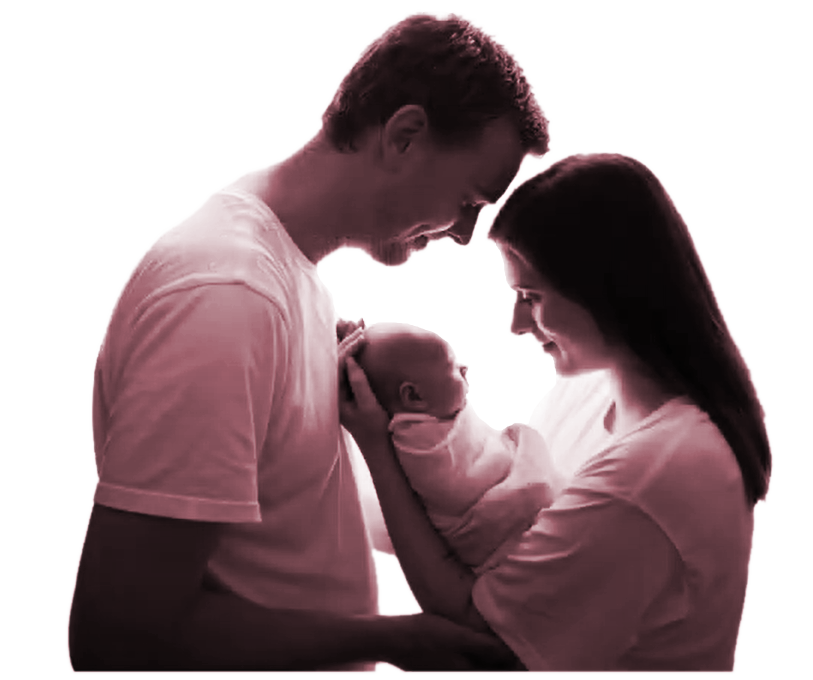 ‘Expecting and New Parents – empowers new parents with information and strategies for welcoming a baby with a hand difference. Topics are: Finding Out, Telling Others and Getting Connected.
‘Expecting and New Parents – empowers new parents with information and strategies for welcoming a baby with a hand difference. Topics are: Finding Out, Telling Others and Getting Connected.
‘School Age – equips children to introduce their hand difference, achieve self-care and independence, make friends and build confidence. Topics are Starting School & Participating in Activities, Making Friends & Building Confidence, and Self-Care & Independence.
Teens – encourages teenagers to feel good about themselves, prepare for further study and work, and gives positive role models. Topics are: Feeling Good About Myself, Role Models and Life Skills.’
For 22 years, Aussie Hands has been working to promote inclusion and respect, aiming for everyone to be accepted and for differences to be celebrated.
Questions If you have any questions about booking a mentor please do not hesitate to email Cassie.
About our Sponsor
 The Aussie Hands Peer Support Network was made possible by the NDIA ILC Individual Capacity Building Program – an Australian Government initiative.
The Aussie Hands Peer Support Network was made possible by the NDIA ILC Individual Capacity Building Program – an Australian Government initiative.
New Board of Management and President for Aussie Hands
Aussie Hands has a new Board of Management, headed by the new President Stuart John, after the Annual General Meeting held on 27 October.
 Stuart comes into the role following his involvement with the Australian Government funded Individual Capacity Building (ICB) Project. Born with a hand difference as a result of amniotic band syndrome, Stuart has previously worked with a not-for-profit board and is aware of the challenges they face.
Stuart comes into the role following his involvement with the Australian Government funded Individual Capacity Building (ICB) Project. Born with a hand difference as a result of amniotic band syndrome, Stuart has previously worked with a not-for-profit board and is aware of the challenges they face.
Stuart aims to continue the great work of the Aussie Hands Foundation, and is looking forward to the ICB Project Resource Toolkit and Peer Support Network going live in early 2022.
Former President Karen Macdonald is staying on the Board as Vice-President and Stuart paid tribute to her leadership over the past 12 months. ‘Covid-19 has made life difficult for everyone – particularly charities and not-for-profits – and it’s a tribute to the previous Board under Karen’s leadership that we were able to navigate through,’ said Stuart. ‘It’s great that Karen is staying on the Board of Management as Vice-President, helping form a strong leadership group along with Alanna Mitchell as Secretary and Robyn Antill as Treasurer.’
Aussie Hands New Board of Management
Members are invited to nominate for Board positions at each Annual General Meeting. Incoming President Stuart John thanked retiring board members Craig Parsons, Areeb Ovais, Larah Cornthwaite, Alicia Fenwick, Amir Neshasterhiz, Lisa Ross and Annette Smeaton for their work over the last 12 months, while welcoming Alanna Mitchell, Bruno Gortan, and Stephen Powis to the Board.
The new Board of Management is:
- Stuart John (President)
- Karen Macdonald (Vice-President)
- Robyn Antill (Treasurer)
- Alanna Mitchell (Secretary)
- Elizabeth Borg
- Hannah Cole
- Bruno Gortan
- Louise-Kate Grey
- Fiona Passmore
- Stephen Powis
- Dave Serpell
Stuart also paid tribute to Belinda von Bibra, who is finishing up as the Aussie Hands National Coordinator, as well as the many other volunteers that help make Aussie Hands what it is today.
Stuart can be contacted at president@aussiehands.org
Story of the Month
Handling difficult decisions about surgery – Alicia & Charlie’s story
Fiona Passmore
When Alicia asked her 7-year old son, Charlie, if he was OK with her talking to Aussie Hands about his difference, he replied ‘Of course, that’s so good. Just because I’m different doesn’t matter, we can talk about differences, you can talk about it whenever you want.’ Thanks Charlie for your enthusiastic approval.
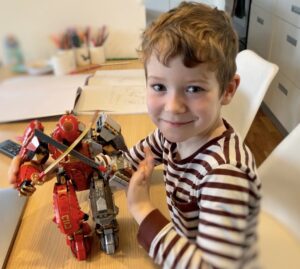 Discovering and talking about hand differences became part of Alicia and husband John’s life after her 20-week scan, when they were told that Charlie was missing his ring and middle finger on his left hand. Fortunately, the genetic counsellor gave them details about Aussie Hands and they were keen to get more information to make sense of what they’d been told.
Discovering and talking about hand differences became part of Alicia and husband John’s life after her 20-week scan, when they were told that Charlie was missing his ring and middle finger on his left hand. Fortunately, the genetic counsellor gave them details about Aussie Hands and they were keen to get more information to make sense of what they’d been told.
Call for Peer Mentors – Individual Capacity Building Project Update
Jacqueline Banki, ICB Project Manager
The ICB Project is in it’s exciting stage of development!
Peer Support Network (PSN)
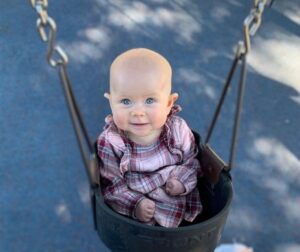 Register now to be a Peer Mentor by emailing Cassie cassieproject@aussiehands.org
Register now to be a Peer Mentor by emailing Cassie cassieproject@aussiehands.org
Starting in early 2022, Peer Mentors will provide support on life stage topics contained in the Resource Toolkit. This will connect members, provide direct access to role models and provide further strategies, support and encouragement. Think of this as our Facebook Group but even more interactive!
For more information, please visit ICB Project.
Resource Toolkit
Workshops: Thank you to all Aussie Hands members who participated in the workshops providing invaluable lived-experience anecdotes and tips which are informing the development of the Resource Toolkit.
Lively discussions took place, with all the workshops delivered online, as we could not travel interstate due to Covid-19. Post workshop feedback was very positive with members feeling that their contributions were valued and that leadership and influencing opportunities had improved as a result of participating.
Expert Interviews: Interviews with experts have been completed, including with the Commonwealth Disability Discrimination Commissioner, genetic counsellor, hand surgeon, rehabilitation doctor, occupational therapist, psychologist, prosthetist, social worker, teacher and career adviser.
Evaluation Survey
Parents of children between the ages of 0-4 years, are currently being asked to complete an evaluation survey via Survey Monkey and we would appreciate responses back by Sunday 31 October.
Parents of children between the ages of 5-12 and then 13-18 will be send the evaluation survey in the next month or so. The Project Team is looking forward to hearing your feedback on resources being developed to ensure they are aligned with the relevant modules and topics.
More information/questions If you would like more information, please visit ICB Project. If you have any questions about the project or would like to offer input, please do not hesitate to email Cassie.

Story of the month
Paralympic dreams among opportunities knocking for Knox
Fiona Passmore
It’s mind over matter. Anything’s possible if you put your mind to it, the important thing is having a positive mindset.’ – Michael Lyddiard
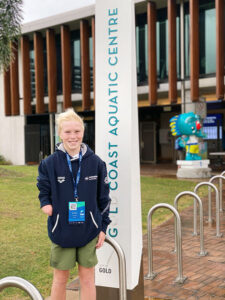 ‘When I tell people what happened to my arm, they sometimes think that’s my joke version of events, and assume I was born like that,’ Knox explained.
‘When I tell people what happened to my arm, they sometimes think that’s my joke version of events, and assume I was born like that,’ Knox explained.
‘It’s a phone call you never want to get,’ his mum Kate remembered, when just before his 4th birthday Knox was involved in a ride-on lawn mower accident, ‘but so many opportunities that Knox has had may not have come about if he didn’t have his arm difference.’
Story of the month
Caeleigh shares her experiences discovering Aussie Hands, discrimination and working with Disney
Lily Toengi-Andrews
‘People seem to think of what I can’t do, but actually they should think about how I might be beneficial as I see things differently.’ - Caeleigh
 Caeleigh wasn’t aware, until this year, of organisations like Aussie Hands and the Lucky Fin Project (USA) and finds them really positive for children and adults with hand and limb differences.
Caeleigh wasn’t aware, until this year, of organisations like Aussie Hands and the Lucky Fin Project (USA) and finds them really positive for children and adults with hand and limb differences.
‘I was raised to believe that I was able bodied and there wasn’t really anything that I couldn’t do, but I think doing the AMP camp (a three day camp for teenagers with amputation, limb loss and limb difference) would have been fun having different opportunities to meet people like me, to see that there is a community out there, would have been nice,’ Caeleigh reflected.
When Caeleigh found out about Aussie Hands, it was only when she visited the website to join, that she found a list with different types of hand differences. Until then she had not known what her arm difference was called. She thought it was pretty crazy that at twenty-three years of age she didn’t discover just how many people there were with these differences. ‘I understand why people might get confused seeing someone with a limb difference, because that information isn’t out there, there isn’t that exposure,’ she added.
Aussie Hands Individual Capacity Building Project Update
Jacqueline Banki, ICB Project Manager
The Aussie Hands ICB Project is making good progress and the ICB Project Team would like to thank Aussie Hands members who have already participated in the first workshop and interview round with more coming up in July.
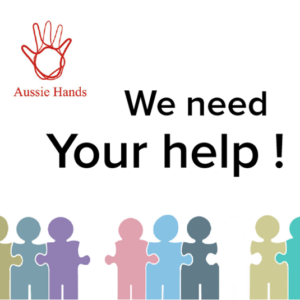 The Steering Committee have approved the modules and topics for the Online Resource Toolkit which have been determined by our member survey, historical and current research into the most common areas of discussion among Members. The Project Team will soon start developing resources for each of the topics combining member lived-experience and information gained from experts, including personnel such as hand surgeons at the Murdoch Children’s Research Institute, occupational therapists, psychologists, prosthetists, teachers, career advisers and the Australian Disabilities Discrimination Commission.
The Steering Committee have approved the modules and topics for the Online Resource Toolkit which have been determined by our member survey, historical and current research into the most common areas of discussion among Members. The Project Team will soon start developing resources for each of the topics combining member lived-experience and information gained from experts, including personnel such as hand surgeons at the Murdoch Children’s Research Institute, occupational therapists, psychologists, prosthetists, teachers, career advisers and the Australian Disabilities Discrimination Commission.
Online Resource Toolkit – Modules and corresponding topics
| Module | Topic |
| Expecting and New Parents (0-4) | Finding Out My Child Has a Hand Difference |
| Telling Others | |
| Getting Connected | |
| School Age (5-12) | Participating in Activities |
| Making Friends & Building Confidence | |
| Self-care & Independence | |
| Teens (13-18) | Feeling Good About Myself |
| Role Models | |
| Like Skills |
Alongside developing the Online Resource Toolkit, the Project Team have also started developing the Peer Support Network and will be reaching out to members who indicated in the ICB Survey that they would like to be involved.
To assess the resources being developed before and after these online tools are launched, Penny Drysburgh from String Research Insights Consulting Pty Ltd has been appointed to assist in developing an evaluation survey which will be sent to relevant member groups for your valued input.
More information/questions If you would like more information, please visit our website ICB Project page. If you have any questions about the project or would like to offer input, please do not hesitate to email Cassie.
Australian Hand Difference Register Annual Report 2020
Aussie Hands is a co-founder of the Australian Hand Difference Register (AHDR) along with the Murdoch Children’s Research Institute. This is the first major research into the prevalence and causes of congenital hand and upper limb disabilities in Australia.
 In the AHDR Report 2020, summary data as at 31 December 2020 shows that there are 874 children registered on the AHDR and findings of the 349 questionnaires completed include:
In the AHDR Report 2020, summary data as at 31 December 2020 shows that there are 874 children registered on the AHDR and findings of the 349 questionnaires completed include:
- Only 20% of congenital upper limb differences were discovered during pregnancy, according to the first 3 years of data collected in the Australian Hand Difference Register (AHDR).
- Radial polydactyly is the most common diagnosis among children, which refers to the presence of an extra digit (or extra digits) on the radial (thumb) side of the hand.
To test or not to test?
Is it better to know or not to know about any genetic influences relating to your child’s hand difference?
A recent research project from the University of Melbourne aimed to identify “The perceptions of genetic testing among families with a history of Congenital Upper Limb Difference (CULD)”. A range of benefits and disadvantages were expressed and reflect the different ways that families would approach this quandary.

Changes in 2020
In 2020, an updated version of the Oberg Manske Tonkin (OMT) classification system was introduced. This is used by health care professionals internationally when giving a diagnosis and is reflected in the updated Aussie Hands brochure. The top 5 diagnoses are slightly different to previous years due to changes in the classification system. With the introduction of the updated OMT classification system, we no longer include ‘trigger digits’.
The AHDR commenced in August 2017 and is recording data of children born with a hand difference and/or arm difference and it aims to:
· find out how many children are born with a hand/arm difference in Australia
· learn more about possible causes and risk factors
· gain information to help plan services
· identify possible participants for future research
· identify the effects of hand differences on children
· decide how best to manage hand differences
If you would like to register or for more information, please contact:
Australian Hand Difference Register – Murdoch Children’s Research Institute
PH: +61 (3) 9936 6766 | Email: ahdr@mcri.edu.au
Story of the month
Julian finds support works both ways when engaging with the Aussie Hands community
Fiona Passmore
Life can sometimes feel like a ride on the swings & roundabouts, but they aren’t necessarily the place you’d expect a coincidence like this to happen. Early last year, Julian was enjoying time with his children at a local playground and noticed a young girl with a very similar arm difference to his She was equally amazed to meet someone who looked like her and ran over to tell her parents about this discovery. That’s how Julian met Aussie Hands Becky and became part of our growing community.
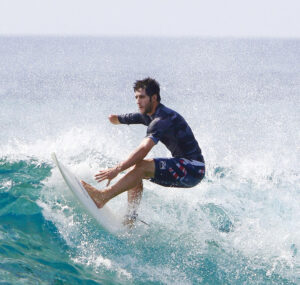 Becky suggested that Julian have a look at the Aussie Hands website where he was drawn to what is his favourite page, ‘I want to help others with a hand difference’. This led him to chatting with our founder Elizabeth and asking how he could contribute. Even though Julian has only been a member since early 2020, his proactive engagement with the Aussie Hands community through our social media pages has already been acknowledged as really valuable. His practical tips have shown us ways to strip cable, hammer a nail into wood with his clothes peg trick or adapt a mountain bike handle just to name a few.
Becky suggested that Julian have a look at the Aussie Hands website where he was drawn to what is his favourite page, ‘I want to help others with a hand difference’. This led him to chatting with our founder Elizabeth and asking how he could contribute. Even though Julian has only been a member since early 2020, his proactive engagement with the Aussie Hands community through our social media pages has already been acknowledged as really valuable. His practical tips have shown us ways to strip cable, hammer a nail into wood with his clothes peg trick or adapt a mountain bike handle just to name a few.
Story of the month
Shevaughn & Steph luckiest mums in the world
Jacqueline Banki
Amelia fills us with the most love and joy we could ever have imagined. Her smile literally lights up a room and you can get lost for hours just staring into her eyes. We feel like the luckiest mums in the world.’ - Shevaughn
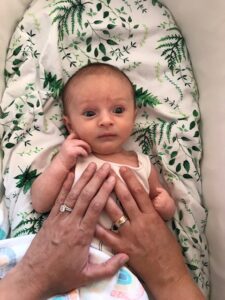 Shevaughn and Steph welcomed their daughter, Amelia, into their lives in December last year. After quite a traumatic birth, Amelia was placed on Shevaughn’s chest, and the doctors and midwives became focused on stopping Shevaughn’s large postpartum haemorrhage. As Steph looked down to admire their new baby girl, she was the first to notice that Amelia was born with a left-hand difference, missing all 4 digits and with a rudimentary thumb.
Shevaughn and Steph welcomed their daughter, Amelia, into their lives in December last year. After quite a traumatic birth, Amelia was placed on Shevaughn’s chest, and the doctors and midwives became focused on stopping Shevaughn’s large postpartum haemorrhage. As Steph looked down to admire their new baby girl, she was the first to notice that Amelia was born with a left-hand difference, missing all 4 digits and with a rudimentary thumb.
‘It wasn’t until much later in the day when the midwife offered some skin to skin, that Amelia was unwrapped and I was able to see her hand for the first time. It was a lot to take in after everything that had happened during the birth,’ reflected Shevaughn.
Aussie Hands Individual Capacity Building (ICB) Project Update
ICB Project Team - Aussie Hands is delighted to announce that Jacqueline Banki has been appointed as the new Project Manager to deliver the Australian Government Individual Capacity Building Grant awarded to The Aussie Hands Foundation Inc together with Project Officer – Cassandra Muller and Digital Communications Officer – Vinnie Chen.
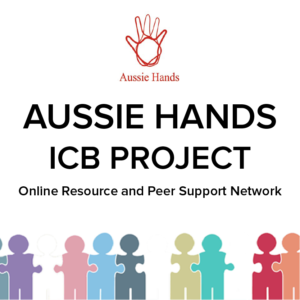 The purpose of the grant project is to develop innovative online resources and a peer support network to empower, enable and facilitate inclusion for people with a congenital hand or upper limb difference and their families. It runs from 1 December 2020 to 30 June 2021.
The purpose of the grant project is to develop innovative online resources and a peer support network to empower, enable and facilitate inclusion for people with a congenital hand or upper limb difference and their families. It runs from 1 December 2020 to 30 June 2021.
The project team is led by a Project Manager Jacqueline Banki who is responsible for Project Planning, Execution, Monitoring & Control, Roll-out and Closure. In addition to the Project Manager, the project is supported by a Project Officer and a Digital Communications Officer. As Project Officer, Cassandra Muller will manage high quality, engaging online content for each of the topics is developed. As Digital Communications Officer, Vinnie Chen will ensure timely updates to Aussie Hands digital media channels including the website, social media platforms and e-newsletter. Aussie Hands is grateful to have attracted such high calibre and experienced interest in the project. Each of the positions will play an important role in achieving the objectives of the grant.
There will be many opportunities for Aussie Hands members to get involved as workshop participants, peer mentors, members of the Steering Committee, or in one of the project roles.
Last Chance – Complete the ICB Project Survey by 5 April 2021!
This is your last chance so don’t miss out on letting us know what you think by completing our ICB Project Survey ! The results of this 5-minute survey will assist Aussie Hands in our new government-funded project in developing an online resource toolkit and peer support network for people with a hand difference and their families. Please help us by completing this short survey about the topics that you think are most important to our Aussie Hands community.
ICB Project and how YOU can get involved
Learn more about the Aussie Hands ICB Project objectives, outcomes expected, updates and how YOU can get involved by visiting ICB Project.
If you have any questions regarding the project please contact: Project Officer – Cassie Muller
Aussie Hands ICB Project Team
Story of the month
Messages about inner and outer strength from Rico Hunkeler, Switzerland
Lily Toengi-Andrews
People of all ages living with finger, hand and upper limb differences can be found worldwide. The Aussie Hands equivalent organisation in Switzerland is Pinocchio. One young Swiss man is sharing an often overlooked but important message for people living with limb differences.
 An upper limb difference can affect body alignment and muscle strength in the arm, shoulder and back that can be hidden long term problems, not always considered in assessments by disability services like NDIS in Australia and the Invalidenversicherung (Disability Insurance) in Switzerland.
An upper limb difference can affect body alignment and muscle strength in the arm, shoulder and back that can be hidden long term problems, not always considered in assessments by disability services like NDIS in Australia and the Invalidenversicherung (Disability Insurance) in Switzerland.
Rico Hunkeler was born and raised in Switzerland and has had similar experiences to Aussie Hands members in Australia. He went to a mainstream school and faced his own challenges. ‘People told me I was born with a strong character and that is why I have such a good attitude towards challenges in life. What they don’t see is all the work I put into myself,’ he explained.
Story of the month
Mat Bowtell of FREE 3D Hands creating joy, combining his altruism and engineering expertise
Fiona Passmore
‘When I was 9 years old, my younger brother had an electric water pistol which I decided to pull apart, make a few modifications and put back together. The end result was brilliant - the water went three times as far and with a lot more force - and I will never forget the smile on my younger brother’s face.’
 This moment sparked Mat’s interest in engineering and was when he realised that he got more enjoyment making things for other people than for himself.
This moment sparked Mat’s interest in engineering and was when he realised that he got more enjoyment making things for other people than for himself.
Growing up in a small, tight-knit community, Mat didn’t know anyone with a hand difference but one of his friends had a rare genetic condition called FOP (fibrodysplasia ossificans progressiva) where skeletal muscle and connective tissue gradually turn to bone. His friend needed a $40k wheelchair but had to fight to get funding, so the local community banded together, held fundraisers and managed to provide 75% of the cost. Mat’s belief in communities coming together to help others was triggered.
Full story
Aussie Hands speak out about ‘The Witches’ movie
– Aussie Hands advocating for limb difference to be celebrated
Jacqueline Banki
Many in the limb difference community are disappointed by the depiction of the Grand High Witch character, played by Anne Hathaway, in the 2020 remake of The Witches by Warner Brothers.
The character’s hands are depicted as evil and scary and look like those of a person born with #symbrachydactyly – a condition where bones in the hands of fingers do not form.
Aussie Hands President, Karen Macdonald, said: ‘This movie is aimed at a young audience and the depiction of a person with a hand difference as scary and evil reinforces stereotypes and stigmas associated with limb difference. This is not acceptable, particularly when there are few role models in film and television for those living with a limb difference.’
‘Hand difference’ refers to congenital hand or upper limb differences ranging from the absence of one or all fingers on a hand and in some cases the absence of part or the entire arm. Around 5 in 10,000 babies are born with a hand difference. The main difficulties are functional limitations, negative social interactions, concerns about physical appearances and adaptation challenges.
Aussie Hands Patron and Paralympian, Jessica Smith OAM, said: ‘I want all Australians to know about the incredible work that this Foundation is doing, and has been doing for the past 20 years!
‘Aussie Hands exists to help support people living with a limb difference, we want young children to feel safe and confident as they grow with their unique differences. The portrayal of ‘evil’ and ‘scary’ in movies is almost always at the expense of someone living with a disability.’
For 20 years, Aussie Hands has been working to promote inclusion and respect aiming for everyone to be accepted and for difference to be celebrated and normalised.
Since the outpouring of comments against the negative stereotypes in the movie, Anne Hathaway has offered her apology stating: ‘I particularly want to say I’m sorry to kids with limb differences: now that I know better I promise I’ll do better.’
An apology was also made by Warner Bros. Pictures which has agreed to work together with organisations such as the Lucky Fin Project to add disclaimers to films and also listen to the voices of people with lived experiences.
‘I don’t believe anyone set out with ill intentions to upset the limb difference community, but now that Hollywood at large is aware, they must do better. And the conversation must continue. Because there are children all around the world who are struggling to understand why their body is used as an example of evil, and that is simply not ok. Through conversation, and through listening… we learn. And when we learn we gain knowledge. And knowledge is power,’ added Smith.
Media Contact: Jacqueline Banki, Marketing and Communications Coordinator
Mobile: 0421 186 526 Email: comms@aussiehands.org
Web: https://aussiehands.org/
Aussie Hands Awarded Major Grant
We are delighted to announce that Aussie Hands has been awarded a $100,500 Individual Capacity Building Grant by the Australian Government. The purpose of the grant is to develop an innovative online toolkit and peer support network to empower, enable and facilitate inclusion for people with a congenital hand or upper limb difference and their families.
Online resources will focus on topics to support new parents, young children starting childcare or school, and teenagers. A peer support network will connect individuals in order to increase confidence, overcome challenges, and take positive action.
The grant will commence on 1 December 2020 and be completed by 30 June 2022.
There will be many opportunities to get involved as workshop participants, peer mentors, member of the Steering Committee, or in one of the project roles. We will be recruiting casual staff members to fill the roles of Project Manager, Project Officer, Project Assistant, and Digital Communications Officer in the next month. For position descriptions of all four roles please click here.
We will keep you up to date with progress.
Special thanks to Brooke Young, the outgoing President, and Lynne Matheson, retiring Board member for their work in preparing the grant.
New President for Aussie Hands
Karen Macdonald will take up the role of President of Aussie Hands and Chairperson of the Board of Management following her nomination at the Annual General Meeting held on 7th October.
 Karen is ideally suited to the role having served as Vice-President for a number of years. She has been a fantastic role model for people with a hand difference and brings a mix of passion, knowledge, and lived experience to the leadership of Aussie Hands. Having two grown-up children gives her strong insights into being a mum with a hand difference. Karen is a lawyer and in her professional capacity and works for the Victorian Government.
Karen is ideally suited to the role having served as Vice-President for a number of years. She has been a fantastic role model for people with a hand difference and brings a mix of passion, knowledge, and lived experience to the leadership of Aussie Hands. Having two grown-up children gives her strong insights into being a mum with a hand difference. Karen is a lawyer and in her professional capacity and works for the Victorian Government.
Karen’s goal is to ensure the continued growth and success of Aussie Hands and to lead staff and volunteers to support people with a hand difference across Australia.
Karen replaces retiring President, Brooke Young. Karen said ‘Brooke has made an outstanding contribution to Aussie Hands over the past decade, helping the organisation to expand nation-wide, launching Limb Difference Awareness Week, supporting the establishment of the Australian Hand Difference Register and securing a government grant for the next 2 years. I’m sure all members will join me in thanking her for her leadership and commitment to Aussie Hands.’
Aussie Hands Announces New Board of Management
Aussie Hands has been operating for 20 years and relies primarily on volunteer support to operate. Members are invited to nominate for Board positions each year at the Annual General Meeting. Incoming President Karen Macdonald congratulated retiring Board members Colleen Birtwistle, Ann Brickhill, Josephine D’Ambrosio and Lynne Matheson and thanked them for their service. Colleen Birtwistle will continue to coordinate Aussie Hands merchandise.
The new Board of Management comprises:
Karen Macdonald (President)
Craig Parsons (Vice-President & Secretary)
Areeb Ovais (Treasurer)
Elizabeth Borg (Ordinary Member and Founder)
Hannah Cole (Ordinary Member)
Larah Cornwaithe (Ordinary Member)
Kate-Louise Grey (Ordinary Member)
Alicia Fenwick (Ordinary Member/Marketing & Communications Lead)
Fiona Passmore (Ordinary Member)
Lisa Ross (Ordinary Member)
Dave Serpell (Ordinary Member and VIC Ambassador)
Annette Smeaton (Ordinary Member and VIC Interstate Coordinator)
Belinda von Bibra will continue in the role of National Coordinator for Aussie Hands. Karen and Belinda can be contacted at info@aussiehands.org
Story of the month
Claire always believing in herself
Fiona Passmore
‘I remember a very emotional but happy moment at our first Aussie Hands picnic when Claire was about 3 years old. This was the first time Claire had met someone else with a hand difference and the memory of her face lighting up when she realised there were other people like her, still brings tears to my eyes.’ - Claire’s mum Danielle remembering their first Aussie Hands Event.
 Before Claire was born, Danielle had suspicions of something being wrong during one of her ultrasounds, but the doctors just put it down to a poor quality image and didn’t investigate further. Soon after Claire’s birth, the Limb Clinic at Westmead Hospital gave Danielle an Aussie Hands brochure and they have been members ever since. ‘Connecting with other people who understand the emotions you go through, particularly in the first few years, is such a great support,’ said Danielle.
Before Claire was born, Danielle had suspicions of something being wrong during one of her ultrasounds, but the doctors just put it down to a poor quality image and didn’t investigate further. Soon after Claire’s birth, the Limb Clinic at Westmead Hospital gave Danielle an Aussie Hands brochure and they have been members ever since. ‘Connecting with other people who understand the emotions you go through, particularly in the first few years, is such a great support,’ said Danielle.
When Claire was young, doctors recommended surgery to separate her thumb from the other fingers, which are all joined, as the ‘mitten hand’ grip would provide more benefit than just a palm with the digits joined together. Danielle is happy that they proceeded with the surgery: ‘It’s made such a difference to Claire’s life and allowing her to do so much.’
‘There was an option of doing further surgeries in the future to separate her other fingers but as they are so small the doctor wasn’t sure they would have ligaments and if surgery would be a success and whether Claire would even be able to use the fingers so we decided against any further surgeries. She is perfect how she is.’
Media Release: Limb Difference Awareness Week 19-25 October 2020
Limb Difference Awareness Week 19-25 October 2020 is promoting the resilience, adaptability and innovation of Australians living with a hand or upper limb difference.
First Officer on a Fokker 100 jet for Alliance Airlines, Jay Bowerman, didn’t allow his missing right hand and forearm to stop him from pursuing his dream of becoming a pilot.
‘After taking my first flight I was hooked. After much hard work, I won a scholarship and with the help of a specially designed and built attachment for a prosthetic arm, I started flying lessons. I flew solo at 17 years of age,’ says Bowerman.
Tips from Jay and other Aussie Hands members on how they will celebrate Limb Difference Awareness Week 2020 include:
- sharing stories at school, work and in the community
- ‘Rock a Sock’ where school students wear a sock on their dominant hand to experience having a hand difference for a day as an in-class activity
- sharing examples of how assistive devices like 3D printed hands help make daily activities like sport, playing an instrument or using technology easier
‘Hand difference’ refers to congenital hand or upper limb differences ranging from the absence of one or all fingers on a hand and in some cases the absence of part or the entire arm. Around 5 in 10,000 babies are born with a hand difference. The main difficulties are functional limitations, negative social interactions, concerns about physical appearances and adaptation challenges.
Limb Difference Awareness Week is a wonderful opportunity to raise awareness and celebrate the differences that make us all unique. It’s important to help both children and adults understand that being different is OK. It’s important to share stories and learn from one another to learn to be more accepting and inclusive,’ said Aussie Hands President, Brooke Young
‘Having a hand or limb difference should not stop anyone from doing the things that most of us take for granted. Aussie Hands is celebrating 20 years of providing support and encouragement to help every person achieve their potential in life. Limb Difference Awareness Week helps us to celebrate difference, get inspired and see opportunities, not limitations.’
Related to Limb Difference Awareness Week is a major research initiative at the Murdoch Children’s Research Institute called the Australian Hand Difference Register (AHDR). The AHDR is a database of children born with a hand difference. The purpose is to determine the prevalence and causes of hand differences. The AHDR is co-funded by Aussie Hands and the Australasian Foundation for Plastic Surgery.
#LDAW2020 #CelebrateDifference #limbdifference
Contact: Brooke Young, President, Aussie Hands
Mob: 0417128097 E: brookemyoung09@gmail.com
Story of the month
Jay flying high through career and family
Fiona Passmore
My favourite part of the Aussie Hands family is seeing how amazingly clever so many people are which inspires me to try new things.
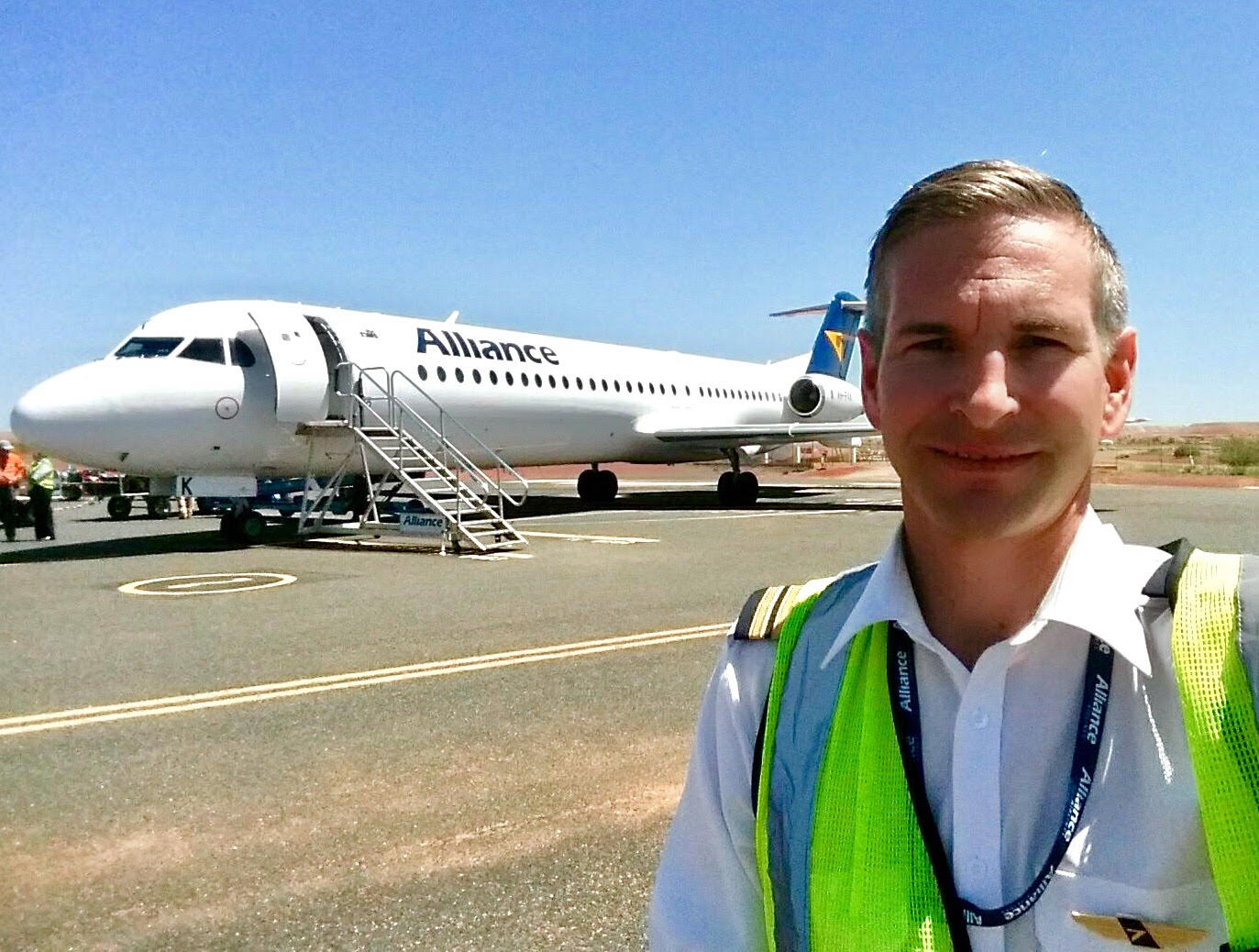 My name is Jay and I’m 38 years old. I’m happily married to my beautiful wife Ashleigh and we have four children, so needless to say life in our house is rarely dull (or quiet). When I need a break from family life I’m privileged to spend my working day at the pointy end of a 100 seat, twin jet airliner. I’m a First Officer on a Fokker 100 jet for Alliance Airlines.
My name is Jay and I’m 38 years old. I’m happily married to my beautiful wife Ashleigh and we have four children, so needless to say life in our house is rarely dull (or quiet). When I need a break from family life I’m privileged to spend my working day at the pointy end of a 100 seat, twin jet airliner. I’m a First Officer on a Fokker 100 jet for Alliance Airlines.
I was born missing my right hand and forearm just below the elbow. However, I didn’t let this slow me down as I had an older brother who I tried to keep up with. Thankfully my parents always encouraged me and offered any support I needed although I usually just adapted to do things ‘my way. I believe these elements were crucial in my development. Two years after my birth my little sister was born and my mum and dad’s family was complete.
I was only a baby when I was prescribed my first cosmetic arm and as a boy occasionally used other prostheses including a split hook and a myo-electric. I never really found prosthetics to be all that much help for anything other than winning fancy dress competitions – I was always Captain Hook! At the age of seven, I decided I didn’t want to wear ‘fake arms’ anymore and that was the way it was for about a decade.
Story of the month
Kate talks resilience, wellbeing and learnings
Jacqueline Banki
‘It’s not about what could have been, it's about what has been, and it’s been nothing short of amazing.’ With these words of reflection, Kate Doughty announced her retirement from elite sport this week, while sharing her own experience of resilience in a year that has been a challenge for us all.'
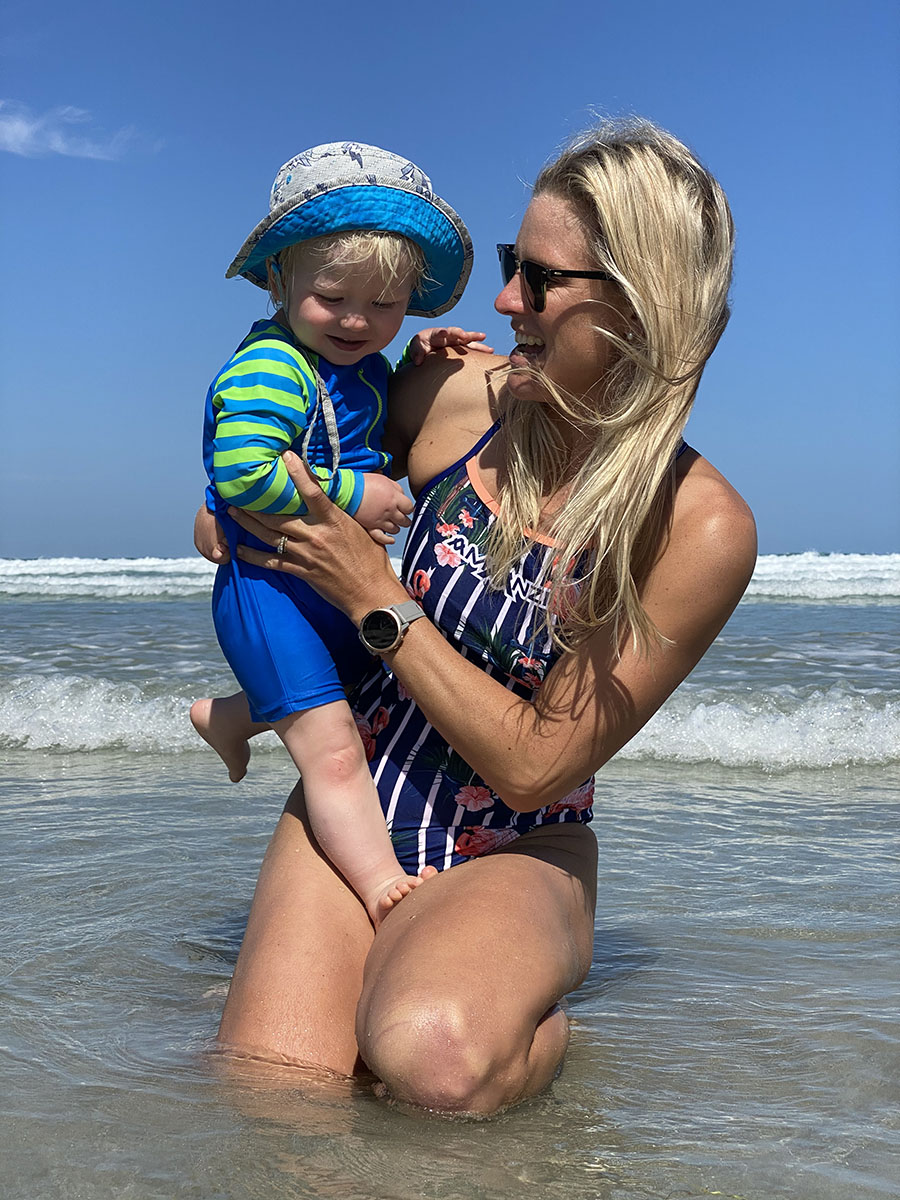 After 12 years serving as Patron of Aussie Hands, Kate Doughty stepped down from the role in 2019 to focus on her campaign for the Tokyo 2020 Paralympics and her family. But due to COVID-19 plans for the year took a different direction.
After 12 years serving as Patron of Aussie Hands, Kate Doughty stepped down from the role in 2019 to focus on her campaign for the Tokyo 2020 Paralympics and her family. But due to COVID-19 plans for the year took a different direction.
Personally, and professionally, Kate demonstrates resilience, and 2020 has seen her reassess priorities for her own wellbeing.
Why are some children born with a hand/arm difference? Insights from the Australian Hand Difference Register.
For years, little information was collected about hand/arm differences which left parents in Australia with many unanswered questions and mixed emotions.
President of Aussie Hands, Brooke Young said: ‘Parents struggle with guilt, wondering if the condition was caused by genetics or something that happened during pregnancy. They want to get answers and know that they are making the best decisions about treatment.’
‘We all want our children to live life to the fullest. For these reasons we were delighted to partner with doctors at the Royal Children’s Hospital and the Murdoch Children’s Research Institute in Melbourne to help establish the Australian Hand Difference Register (AHDR).’
Since commencing in mid-2017, the AHDR now has over 600 children who were born with a hand/arm difference participating. The Register aims to:
• Find out how many children are born with a hand/arm difference in Australia
• Learn more about possible causes and risk factors
• Gain information to help plan services
• Identify possible participants for future research
A congenital upper limb difference is a hand or arm difference that is present at birth. An upper limb difference is present in approximately 0.2% or 1 in 600 of babies born. Sometimes it is detected by ultrasound before birth, but more often it is not found until the birth of the baby.
Head of Hand and Microvascular surgery at Royal Children’s Hospital, Associate Professor David McCombe said: ‘In most cases, the cause is not known but with ongoing research we are learning more about the development of the limbs and what happens in congenital differences.’
Some of the more common differences and diagnoses include (refer to graph below):
• having more or fewer than five fingers (includes radial polydactyly, symbrachydactyly)
• fingers that will not bend or will not straighten (includes trigger digits)
• fingers that are joined together (includes syndactyly)
• bones in the hand or arm that are too short or missing (radial deficiency)
Data from the AHDR 2019 Annual Report show the average age of participants is 5.3 years and the 5 most common diagnoses are shown below:

‘The AHDR is a vital tool that will help us better inform children with a congenital difference and their families. Through the AHDR we are developing a national collaborative research network that we are confident will give us answers to questions about causes and outcomes. As clinicians we would encourage as many families to participate and support the AHDR as much as possible,’ added Associate Professor McCombe.
The Register is managed by researchers at the Murdoch Children’s Research Institute, located at the Royal Children’s Hospital in Melbourne, and includes children from NSW, QLD, SA & WA – with more recruitment sites planned in 2020. The Register has been funded to date by support from the Aussie Hands Foundation Inc. , the Australasian Foundation for Plastic Surgery, and the McNally Foundation.
Using the AHDR to recruit participants has allowed researchers from Melbourne University to explore the concerns, lifestyle impact and positive aspects of having a hand/arm difference. How these children cope with their hand difference is as variable as the differences they each have. Some want to change their hand appearance, others accept it, like it or are proud of their scars. Further research looking into the experience of families with children with congenital hand differences is in development, (see details in the AHDR 2019 Annual Report)
Aussie Hands provides a range of services to support people with hand differences and their families. You can help by donating to Aussie Hands so that work in support, networking and research can continue.
Story of the month
Finding joy together as a family during COVID-19
Lily Toengi-Andrews
Toni and Hedge have two beautiful daughters, Rebecca and Jessica. During April and May they spent two months in isolation in Melbourne and have experienced both challenges and joy in spending so much time at home together.

The family joined Aussie Hands almost 10 years ago, just after daughter Jessica, was born with a hand difference. After being advised of the option of amniocentesis – testing for genetic or chromosomal abnormalities – or a termination at 20 weeks and deciding on neither, Jessica was born.
Story of the month
Areeb’s experience is absolutely amazing and rewarding
Jacqueline Banki
‘Absolutely amazing and rewarding!’ That is how Aussie Hands Treasurer, Areeb Ovais, summed up his last two years of engagement with Aussie Hands.

Areeb first heard about Aussie Hands in 2018, while searching for an organisation that brought together people with upper limb differences. ‘I was fortunate enough to connect with Elizabeth Borg through the Aussie Hands Facebook group,’ said Areeb.
He was quite proud of becoming a member of such an established organisation in Australia and said: ‘Meeting Elizabeth, the founder of Aussie Hands, then hearing her story behind the organisation and her son Dave made it quite special and personal for me.’
Story of the Month
Callie cuts through the anxiety of starting kindergarten
Lily Toengi-Andrews
As parents we navigate our way through life, taking small and often large, steps as each new challenge arises for our children and ourselves.

When one of our children has a hand or limb difference the challenges can seem more intense and confronting as we try and guide them unscathed through life and develop a sense of belonging in society. Sometimes we need to be brave enough to just be there for them when they need us and at other times stand back and watch them blossom. School is one of these steps.
Aussie Hands twins, Callie and Phoebe, started kindergarten this year. School is already daunting for a five-year-old without the extra attention that a hand difference may bring. Callie has a hand difference and is showing mum and dad, Mandy and Phil, how she can shine at school.
Callie and Phoebe were in the same class in preschool but are in separate classes at kindergarten. Their mother and New South Wales Aussie Hands State Coordinator, Mandy said: “The girls are in different classes to enable each of them to shine bright and to grow in independence and confidence. It has worked really well so far, they have grown closer together at home, but it has also allowed them to create independent friendships at school.”
“Callie struggled in the first couple of weeks to make friends independently, but now she has found her voice,” added Mandy.
When asked what school meant to her, Callie replied: “To learn, to read, to write, to spell,” and about her favourite part of class she said: “To write, spell words and help my friends to cut and glue their work.”
It seems the first couple of weeks are well behind Callie as she explained who her many friends are and what she likes doing at lunch and recess: “My friends are Joy, Anya, Tomiwa, Harmony, Diva, Esther, Kalani, Lily, Gnit, Nitnit and I love to play tag and ibble obble black bubble.”
Starting children with hand and limb differences at school can be worrying for parents when they know that they are not going to be there for the questions and the stares that may occur. On asking Mandy how they helped Callie’s move to school, she said: “We tackled this up front. I sent in stories and resources as well as her Doll Like Me for Callie and her teachers to share with her grade in the first week.
“She is known and loved by many in the playground, although I have witnessed a few stares and comments. I am in the middle of addressing this with the school as I noticed that Callie regressed and was sad when this happened.”
“At the time I stepped in and used Nemo (from the Disney film Finding Nemo) as an explanation which was a happy common ground for the kids. The school has been very supportive and mainly assist her in growing in confidence. They will be addressing the other grades shortly to avoid more stares and comments,” added Mandy.
Parents who have kindergarten before them may be anxious, but they should know there is a lot more support for their children now. Mandy advised: “Take time to tour the school, set up meetings to discuss your child’s needs and become part of the school community. It is really important to have confidence in the school that will assist you in moulding your child into the person they become.
“Utilise the Aussie Hands pamphlet for teachers and ensure the school is confident in limb difference language and any individual support your child may need including making sure they are confident in helping assist with any prosthetics or aids your child may use. If they are not confident your child will sense it.”
Mandy and Phil expect both girls to reach for the stars. Callie may need a little more time occasionally, but there is nothing that she is not expected to try, just like the rest of the class.
“In fact, Callie is assisting other children with their cutting as apparently, she is a more skilled cutter than some of her classmates,” said Mandy. Callie has recently won her first award for being an independent worker and striving to always do her best. Any parent would be proud of these successes.
As both Callie and Phoebe blossom in their own unique ways, it is reassuring to know that school can be less confronting than expected. Support, awareness and understanding of hand and limb differences is more widely embraced as our children start to take these brave steps through life.
Thanks to Callie, Phoebe, Mandy and Phil for sharing their inspiring Aussie Hands story.
Cancelled: Aussie Hands March and April Events
The Board has decided that the events organised by Aussie Hands in March and April 2020 will not go ahead.
While it is disappointing for members and volunteers, this seems a prudent course given the current health warnings and advice from the Chief Medical Officer that people try and avoid non-essential gatherings.
We appreciate that organisers have put time and effort into arranging these get togethers and that one of Aussie Hands strengths is its social networks. We are sorry for any disappointment and if you wish to discuss this please send an email to info@aussiehands.org and a board member will contact you. We are monitoring the situation as it develops but at this stage, we do not anticipate any change to our planned events later in the year. The impact of Covid-19 is a trying time for all of us and our families and our thoughts are with you all.
Aussie Hands Appoints new Patron, Jessica Smith OAM
Lily Toengi-Andrews
Aussie Hands is pleased to announce that Jessica Smith has been appointed as Patron, effective from February 2020. Jessica succeeds Kate Doughty, who has served as Patron for the past 12 years.

Speaking on behalf of the Board, Chairperson Brooke Young says: ‘Jessica is the ideal person to step into the role of Patron. She is one of Aussie Hands most loved members and an inspiration to people of all ages. Her writing and speaking about positive body image, setting goals and celebrating difference is powerful and uplifting. We are certain that Aussie Hands will benefit greatly from having someone of Jessica’s profile and energy as Patron.’
Jessica brings a rich and varied background to the position. She was awarded the Medal of the Order of Australia (OAM) in last year’s Queen’s Birthday 2019 Honours List. Jessica is well known to members of Aussie Hands because of her book Little Miss Jessica Goes to School. What you might not know is that Jessica represented Australia in swimming, from the age of 13 to 20, travelling overseas every year that culminated in her participation in the Paralympic Games in 2004. Jessica retired from swimming when she was 21 and went on to study a Bachelor of Science in Public Health. From her own personal challenges with health and body image she has become a passionate advocate and activist for positive body image and diversity.
Taking on the role of Patron, Jessica reflected: ‘For the past few years I have watched in awe as my predecessor, Kate Doughty contributed to the growth and expansion of Aussie Hands. Kate will be sorely missed as Patron, but I’m sure I speak on behalf of all members in wishing Kate every success in her future personal and professional endeavours, and of course, I will be joining members as we cheer loudly while she commits herself to making the Australian Paralympic Team to compete in Tokyo later this year.
I am delighted to join an organisation that continually strives to enrich the lives of people living with a hand difference and their families. I hope that I can help members by sharing my personal journey and highlighting the wonderful opportunities and success I’ve had thanks to my hand difference. Bringing more awareness to the organisation will be one of my immediate goals, and I hope to use media and social media platforms to do this. Building social awareness is crucial to the longevity of Aussie Hands, as it will enable more members of the wider community to understand and appreciate the importance of our work.’
Jessica says that she aims to expand the organisation’s membership, volunteer and donor base and support the wonderful work being done around Australia through an active social media campaign.
She is experienced with the power of social media. Jessica began the ‘Join the Revolution’ campaign to help inspire people to accept themselves as they are and to support and unite people from all around the world. The success of the campaign has led her to become a motivational speaker and she now educates others about positive body image, diversity and mental health. She has stood on many stages including: UN events, schools, universities, businesses and communities sharing her story and in-depth analysis of these issues. Her dedication has included working with not for profit organisations and as an Ambassador for various foundations in Australia. Jessica has received many awards for her work as an advocate in the community and recently achieved one of the highest recognitions as an Australian.
On 24 October 2019, Jessica received an OAM for service to the community through a range of roles. The OAM was presented to her at the Australian Ambassador’s residence in the United Arab Emirates (UAE), conducted by His Excellency Mr Arthur Spyrou, where Jessica is currently living with her husband and three children. An OAM is presented to Australian citizens in recognition of outstanding achievement or meritorious service that she has reached on both levels.
Jessica will travel back to Australia regularly and thanks to the wonders of social media will be able to keep up to date with Aussie Hands members and activities. She has invited members to follow her on Instagram @jessicasmith27.
Story of the month
Bonnie Gillespie, a fighter and lover of life
Lily Toengi-Andrews
Fiery red hair, muscles upon muscles, charming Kiwi accent, loud laughs, big smiles and jumping around like a fire cracker – this is Bonnie Gillespie.
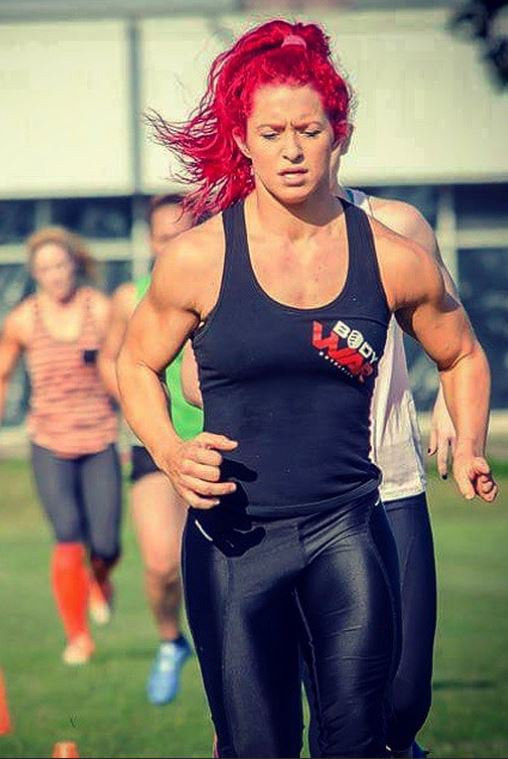
This is Bonnie Gillespie. A fighter and a lover of life. Bonnie has just won her second Mixed Martial Arts (MMA) cage fight and is looking upwards, her trajectory is to reach the Ultimate Fighting Championship (UFC) – Ronda Rousey territory for the uninitiated. Oh, and Bonnie has a hand difference that has been part of her journey, her strength and determination.
Bonnie grew up in Levin on the north island in New Zealand. She said, “I respected my elders and teachers but then the bullying started in primary school, when I was around ten.” People had always noticed her hand difference but then it became bullying. She asked her parents and brothers what she should do, what she should say, and received conflicting messages. Her dad said ‘knock ‘em down’, her brothers said ‘harden up or drop them’ and her Mum said ‘you can’t retaliate because you will get in trouble’. But she did retaliate as her first instinct was to follow in her brothers’ and father’s footsteps with so many males in the house. Bonnie said, “I was copping it every day and started fighting, getting sent to the Principal’s office, moved to other classes as I was distracted by the bullying in the classroom.”
There wasn’t any support groups like Aussie Hands or Limbs for Kids in her home town. Her mum took her to the local Kimberley Centre in Levin that was once the largest centre for the intellectually disabled in the Southern hemisphere. They made her a strap to put a knife and fork in, but it didn’t work for her, so she just adapted and used her hand as a scooper for peas and such. She said that back then there was around 10,000 people in Levin and they were all big families. Everyone knew everyone – there were only a few kids around with limb differences that she knew of. She became mates with Brent Tucker, also from Levin, who is a rep rugby player and rep cricket player. And it hasn’t stopped Bonnie doing anything as well. Bonnie was a track cyclist and swimmer in New Zealand and has participated in rugby, gymnastics, Judo dancing, Brazilian jujitsu, Zen Do Kai karate and Muay Thai boxing. Bonnie said, “My brother was Sportsman of the Year at college and I was sitting back in the audience thinking, I am going to be there next year. And I made it happen. You had to do 12 to 15 sports to be up on that stage.”
Bonnie has also achieved success in the Legends Football League (LFL) in 2013-2014. The male voice over on Bonnie’s LFL story says, ‘One who engages battle courageously, a warrior’ and ‘fireball of intensity, passion and heart.’ Monique Gaxiola, another former player with the LFL said, ‘She is a different breed and not from this planet! She’s a beast on the field and a little ball of muscle.’ Bonnie only wore one glove in the game and said, “I had extra training for catching. People were wondering why I only had the one glove and wanted to know about my hand, but I just focussed on catching with one hand and closing the gap with practice after practice after practice.” Her inspiration and motivation have been her brothers, “I’ve always been competing with my brothers to be at their standard. I decided I was going to fight life because this hand is nothing compared to what is out there.” People like pro skateboarder, Felipe Nunes, who lost both his legs when he was six and our own Nicholas Vujicic from Melbourne who was born with no legs or arms, tried everything possible, and is now a motivational speaker that travels the world.
I asked Bonnie if she was a warrior off the field as well and if this had anything to do with her hand – was it part of her persona to combat the questions, the scrutiny? She said, “Yeah, I think so, from day one. I’ve had to prove myself. There are always walls that come up and I have to smash them down, and then I walk away and go elsewhere. That’s why I always go to different sports and learn new stuff. But yeah, overall I am a strong woman and I know who I am. So it hasn’t broken me yet. I’m a warrior.” Bonnie has taken this attitude into the cage with her. She puts a lot of time into training. There is blood, sweat and tears. Her journey to the cage started way back in Levin when she was working at a gym with Dale and Loretta Winiana, “they taught me proper technique, posture and to be confident, not to be ashamed to stick your chest out. To this day I still have great form and I have never had an injury, so props to them. Yeeeahhhh.” Bonnie laughs loudly with this highly infectious laugh she has.
Bonnie said in the cage she unleashes the beast, “I just use all the negatives, all the bad things I have experienced, the negative things people say, because it has been a battle, and my inner warrior comes out on the field or in the cage. But I also use all the positives that come my way as this inspires me and inspires others to give them the courage to do exactly what they should be doing.” Bonnie gets lots of questions on Facebook, mainly from mums reaching out about their children ‘copping it’ but also about training in the gym and what does she suggest they (and children) can try. She said, “I love receiving questions like that.” I asked her what she wants other people to know about Aussie Hands kids and, in fact, any child with a difference. She says, “I just want them to know that they are okay, that there is nothing wrong with them. Just reach out. Don’t look at them in a strange way or judge them as they just want to be accepted like you do. They want to be motivated, pushed, told you can do it. Don’t shut the doors on these people because that is when they start losing confidence.”
My last question was, how do we inspire our Aussie Hands kids? Bonnie said that in this world we are living in now, saturated by media, we have these opportunities to, “see inspiring videos, join platforms that constantly upload these videos of inspiring kids and adults. Remind them never to give up. Stay motivated and surround yourself with, and be driven, by the right people – motivational, positive, uplifting people.” The Aussie Hands NSW group were lucky to meet Bonnie at their 2018 Christmas Picnic.
Thanks Bonnie for the wonderfully fun chat and inspiring words.

Go Bonnie in your third MMA cage fight!
Kate Doughty Steps Down as Patron after 12 Years
December, 2019
Kate Doughty is stepping down as Patron of Aussie Hands.

Kate, the inaugural Patron of Aussie Hands, is resigning to focus on her campaign for Tokyo 2020 Paralympics and her family.
Speaking on behalf of the Board, President Brooke Young said ‘Aussie Hands has been privileged to have Kate as Patron for more than a decade. She has inspired us, been an amazing role model and helped members take pride in who they are. In addition, Kate has been a strong advocate in establishing the Australian Hand Difference Register, co-founded with the Murdoch Children’s Research Institute.’
Kate said: ‘It has been an absolute pleasure to have worked with Aussie Hands Founder, Elizabeth Borg and the team over the years, and I commend the team on all their hard work and tireless efforts to create what Aussie Hands is today.
I have watched young members of Aussie Hands grow into confident young adults, thriving in all they do and navigating their own path in life, whilst becoming wonderful role models for newer and younger members.
I feel very honoured and privileged for the wonderful opportunity that Aussie Hands has given me as Patron, and that my journey has inspired others along the way. It has been great to meet many wonderful families over the years, and I hope to continue to stay in touch and cross paths in the future.’

Kate invited Aussie Hands members to keep connected as she campaigns for Tokyo 2020 Paralympics via Instagram @katedoughty01.
Brooke says that Aussie Hands is seeking a new Patron, and an announcement will be made when Kate’s successor is appointed.
Seasons Greetings
From the National Co-ordinator, Belinda von Bibra
Dear Aussie Hands members,
As we near the end of 2019 we reflect on the journey’s we have travelled together over the past year. Our amazing Aussie Hands community has continued to come together to provide support, grow our network, exchange information and support research initiatives into hand differences. In the new year key focus areas will be awareness, attraction, engagement and retention. The year 2020 promises new adventures and celebrations for us to share together and heralds the milestone of Aussie Hands turning 20 in 2020!! Woo hoo!! What an incredible tribute to you all.
Looking for gift ideas? Have you visited our online store? We have a variety of merchandise from useful aids such as the JarKey to the wonderful Little Miss Jessica goes to School book and fun stocking fillers like our biscuit cutter and yo-yo. https://aussiehands.org/shop/
I would like to take this opportunity to wish you all the very best of Seasons Greetings and I look forward with anticipation to the adventures ahead of us in 2020.
Belinda von Bibra
National Coordinator
Media Release: Limb Difference Awareness Week 18-24 October 2019
#CelebrateDifference
Limb Difference Awareness Week (18-24 October) highlights how adaptable, determined and innovative people can be.
Can you imagine what life would be like if you were missing fingers or your hand? Playing your favorite sport, instrument, going to work or using a smartphone might be a challenge! But having a hand or limb difference shouldn’t stop anyone from doing the things that most of us take for granted. Limb Difference Awareness Week (18-24 October) highlights how adaptable, determined and innovative people can be.
Around 3 in every 10,000 children are born with a hand difference. In addition, people can lose fingers as a result of illness or injury. Aussie Hands is an organisation that exists to provide a network of support, information and encouragement to help every person achieve their potential in life. Limb Difference Awareness Week helps us to celebrate difference, get inspired and see opportunities, not limitations.
Related to Limb Difference Awareness Week is a major research initiative at the Murdoch Children’s Research Institute called the Australian Hand Difference Register (AHDR). The AHDR is a database of children born with a hand difference. The purpose is to determine the prevalence and causes of hand differences. Launched in 2018, the AHDR has now been rolled out across Australia. The AHDR is co-funded by Aussie Hands and the Australasian Foundation for Plastic Surgery.
Contact:
Brooke Young, Chairperson, Aussie Hands
Mob: 0417128097 E: brookemyoung09@gmail.com
https://aussiehands.org/?s=limb+difference+awareness+week | www.mcri.edu.au/ahdr
Welcome Belinda to the Aussie Hands Community!
From the Chairperson, Brooke Young
Aussie Hands is pleased to announce that Belinda von Bibra has been appointed as the part-time Aussie Hands National Coordinator, commencing in October.
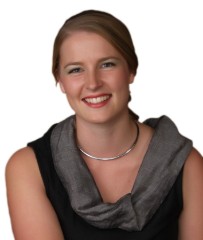
Aussie Hands is pleased to announce that Belinda von Bibra has been appointed as the part-time Aussie Hands National Coordinator, commencing in October.
Belinda has been actively involved in community and health sectors during her career working within public, private and not-for-profit organisations. She is passionate about understanding individual and community needs and works collaboratively to develop innovative solutions.
She holds other roles with the Children’s Hospital Foundation in Brisbane and is a Non-Executive Director and Company Secretary for Suncare Community Services.
In the past, Belinda has worked as National Research Director for the Emergency Medicine Foundation, and successfully implemented a new funding system to expand their services and research initiatives. She managed the University of Southern Queensland’s commercialisation unit and led the team to raise its first multi-million dollar research investment to establish a Smart Assistive and Independent Living research program that focussed on addressing the barriers to adoption of technologies in communities. The program developed new models of care that enabled Queenslanders with special needs to remain independent and in their own homes.
Belinda studied at Queensland University of Technology and holds a Bachelor of Biotech Innovation and an MBA. She was awarded Outstanding Young Alumni award by QUT in 2006. Belinda is also a graduate of the Australian Institute of Company Directors.
As the mother of three young children and an auntie to a child with a hand difference, Belinda is passionate about encouraging all children to achieve their potential, build confidence and develop a positive self image. Belinda is based in Brisbane.
We are confident that Belinda’s experience and personal qualities, energy, positive approach and passion for Aussie Hands will help her connect effectively with members across Australia. The focus of the role is member communication, project management and ensuring that Aussie Hands continues to meet the changing needs of members.
Please join us in welcoming Belinda to the Aussie Hands community!
Kind regards,
Brooke Young
Chairperson, Aussie Hands
Member Update
From the Chairperson, Brooke Young
Spring has sprung across Australia and it is also a time for growth and renewal at Aussie Hands.
We have some exciting things happening and I wanted to update you on 5 things:
1. Expanding our Volunteer Team
Aussie Hands relies on you! We exist to support people with a hand difference achieve their potential; share information and resources and invest in research about hand differences.
Thank you to all members who give of their valuable time to make our organisation a success. Whether you help out at events, work as an Interstate Coordinator, serve as a Board Member or share your stories on Facebook, we need you to achieve our objectives.
Our team of volunteers has expanded recently – we now have specialist volunteers in events, marketing and communication and administration. Some volunteers are Aussie Hands members and some are recruited through the Boroondara Volunteer Resource Centre, the Genetic Support Network of Victoria and through Aussie Hands members. Please join with me in welcoming James McClusky, Devni Kudewela, Lillian Nguyen, Vinnie Chen and Cassie Muller.
The Aussie Hands Office has had a spring clean and has moved to Level 3 of Ross House, located in the heart of Melbourne (247 Flinders Lane, Melbourne).
2. Australian Hand Difference Register (AHDR)
It is estimated that 3 in every 1000 children are born with a hand difference. The causes are not yet known, but the AHDR is designed to find our more. Aussie Hands is a partner in this research and is a co-funder. The following hospitals are now participating:
o The Royal Children’s Hospital
o Monash Children’s Hospital
o Sydney Children’s Hospital, Randwick
o The Children’s Hospital at Westmead
o Queensland Children’s Hospital (formerly Lady Cilento)
o Adelaide Women’s and Children’s Hospital
o Perth Children’s Hospital (formerly Princess Margaret
If you would like to be involved contact ahdr@mcri.edu.au. If you would like to make a donation, this can be done through https://aussiehands.org/donate/
3. Research Project – Impact of hand differences on children
Lucy McDougall from the Australian Hand Difference Register research team has completed a study on the impact of hand difference on children. The study reports that a child’s function, perception of appearance and social interactions are impacts and there are also positive aspects of having a hand difference. Find out more here.
Finally, thank you for being involved with Aussie Hands. It is a community that shares experiences, ideas, resources, inspiring stories and helps people with a hand difference achieve their potential. I encourage you to come along to events and workshops in your local area or get involved online through our Facebook, Instagram and LinkedIn pages.
Kind regards,
Brooke Young
Chairperson, Aussie Hands




